If you're a health-conscious drinker, non-GMO beers are a fantastic choice. These brews use organic ingredients and sustainable brewing practices, ensuring you get quality without unwanted chemicals. You'll find a variety of flavors, from hoppy IPAs to refreshing wheat beers, all crafted with natural yeast for authentic taste. Plus, drinking in moderation can even lower your heart disease risk. With the rise in demand for these healthier options, many craft breweries have jumped on board. Exploring the best non-GMO beers will reveal even more about your options and what to look for in your next brew.
Key Takeaways
- Non-GMO beers prioritize organic ingredients, reducing pesticide exposure and promoting sustainable farming practices for health-conscious consumers.
- Many craft breweries, like Dogfish Head and Mill Street, offer a variety of non-GMO options with unique flavor profiles.
- Light to moderate consumption of non-GMO beers may provide heart health benefits while minimizing risks associated with excessive drinking.
- The growing demand for non-GMO and organic products reflects a shift toward healthier beverage choices among consumers.
- Understanding beer types—ales and lagers—can enhance appreciation and inform healthier drinking decisions.
Benefits of Non-GMO Beers

Choosing non-GMO beers offers a range of benefits that enhance both your drinking experience and the environment. First off, these beers often use traditional brewing techniques that rely on natural yeasts and organic fermentation processes. This means you're likely to enjoy a more flavorful and authentic beer, crafted with care.
Many non-GMO breweries source their ingredients from local farmers, which not only ensures freshness but also reduces transportation impact. By supporting local economies, you're contributing to community sustainability. In fact, a 2023 survey revealed that 50% of beer drinkers prefer non-GMO options, highlighting the growing consumer demand.
Plus, these breweries prioritize sustainability by using ingredients grown with organic and regenerative practices, avoiding harmful synthetic pesticides and fertilizers. This approach helps protect ecosystems and promotes soil health, leading to lower greenhouse gas emissions.
You can drink with confidence knowing that strict organic standards govern production, ensuring transparency and trust in your beverage. Each sip you take supports farmers committed to environmentally responsible practices, encouraging others in the industry to follow suit.
In essence, by choosing non-GMO beers, you're not just enjoying a quality drink; you're making a conscious choice that benefits both your palate and the planet.
Health Implications of Beer
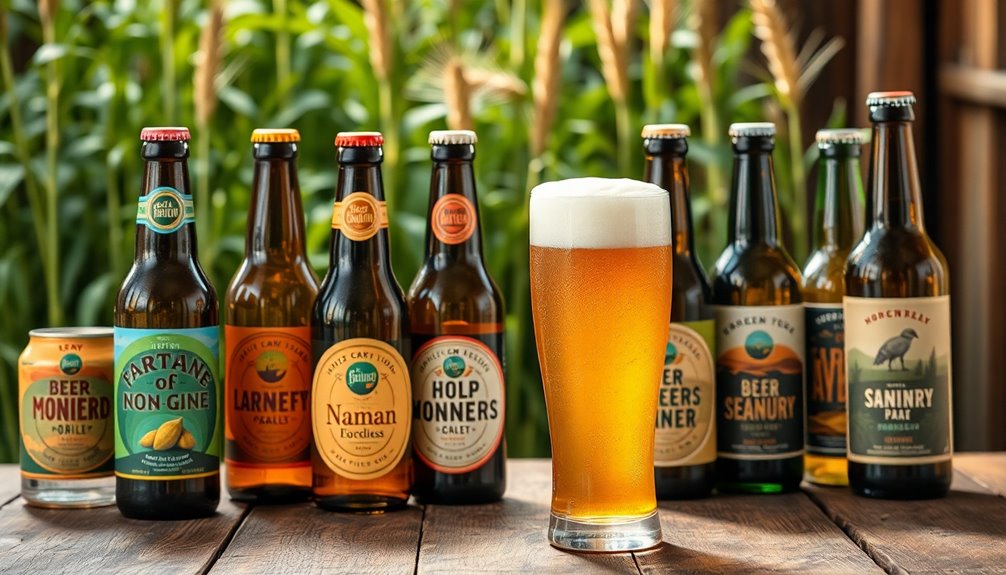
Drinking beer can have significant health implications, both positive and negative, depending on the amount consumed. On one hand, light drinking might offer some protective effects against heart disease and diabetes. For instance, men who consume about 0.8 drinks per day may lower their risk of heart disease by 14%, while women might see an 18% reduction with 0.9 drinks. Additionally, moderate consumption of beverages like coffee can support gut microbiota health, which may also positively influence overall wellbeing. It is essential to recognize that individual responses to alcohol can vary based on personal circumstances.
However, excessive consumption poses serious risks. Immediate effects can include flushing, confusion, and emotional instability, while long-term risks are even more alarming. Heavy drinking can lead to hypertension, heart disease, and liver issues, not to mention the potential for addiction. It can also drastically reduce your life expectancy—by up to 28 years in extreme cases. Additionally, moderate alcohol consumption has been linked to a potential reduction in the risk of atherosclerosis and coronary heart disease.
Moreover, the empty calories in beer contribute to weight gain and obesity, while heavy drinking increases the risk of various cancers. Individual factors play a role too; some people may experience more harm from alcohol than others.
Ultimately, the safest approach to drinking is moderation, or even abstaining altogether, as comprehensive studies suggest that no drinking is the best option for overall health.
Ingredients in Non-GMO Brewing
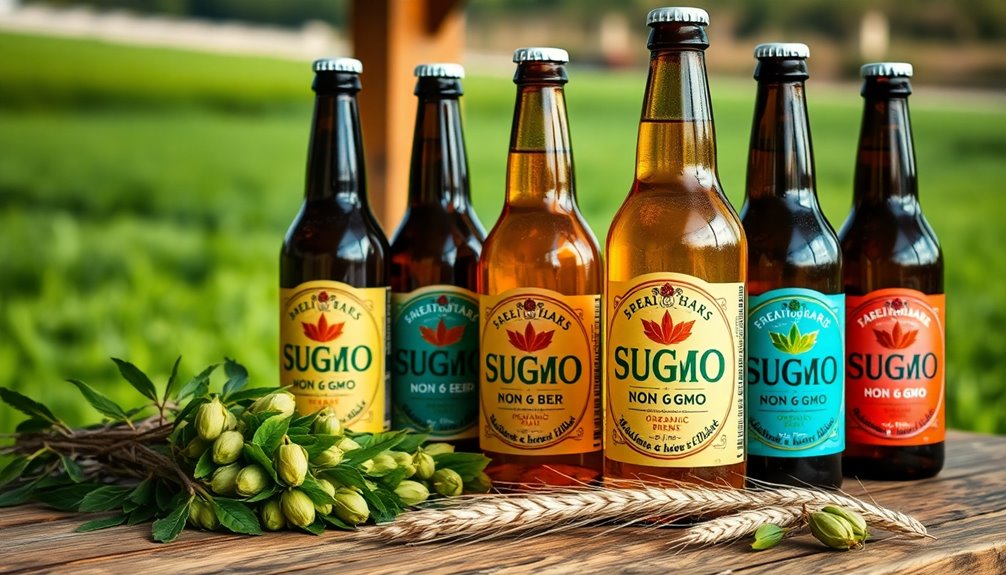
Non-GMO brewing focuses on using high-quality, sustainably sourced ingredients that not only enhance the flavor but also align with environmentally friendly practices.
You'll often find ingredients grown through organic farming or regenerative agriculture, which support local farmers and minimize transportation impacts. Ingredients are certified organic, ensuring no chemical fertilizers or pesticides are used, with strict control measures preventing any mixing with non-organic components.
Malted barley, malted wheat, and various cereal grains form the backbone of these brews, combined with water, hops, and yeast. For beers labeled as organic in the U.S., hops must be organically certified. Additionally, brewers may utilize low alcohol yeasts to create distinct flavor profiles while keeping alcohol content in check.
You might also encounter process aids like naturally produced acids and enzymes that comply with organic standards.
When it comes to yeast, non-GMO beers typically use natural strains, enhancing authenticity and flavor. Special yeast strains, such as those designed for low-alcohol beers, can be developed through adaptive laboratory evolution without genetic modification.
Traditional brewing techniques, including natural fermentation, are commonly employed to create unique flavor profiles. Overall, non-GMO brewing prioritizes quality, sustainability, and taste in every sip.
Current Market Trends
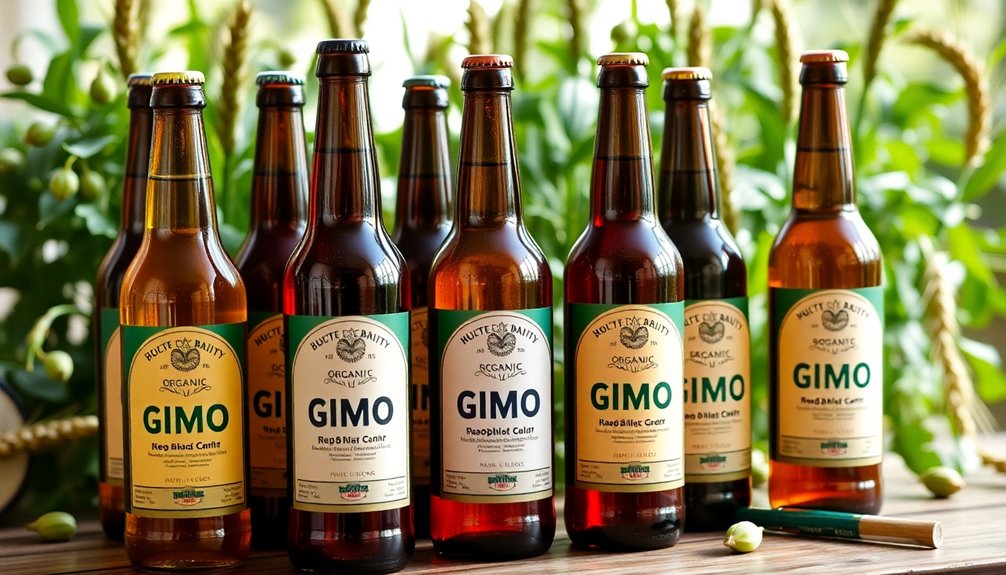
As consumers become more health-conscious, the non-alcoholic beer market, which includes non-GMO options, is witnessing significant growth. Valued at USD 23.23 billion in 2023, this market is projected to reach USD 37.94 billion by 2032, showing a compound annual growth rate (CAGR) of 5.6% during the period from 2025 to 2032.
The alcohol-free segment stands out as the largest and fastest-growing part of this market, particularly in the Asia-Pacific region, where changing habits and rising health awareness drive demand.
You're likely part of a growing trend where healthier lifestyles and reduced alcohol consumption take center stage. As health and wellness become priorities, many consumers like you seek alternatives that align with your wellness goals without sacrificing flavor.
The increased interest in non-GMO certifications reflects this shift, with brands such as Peak Organic and New Belgium leading the way in transparency and trust.
Innovations in brewing are also catering to your needs, with breweries focusing on low-calorie and nutrient-enhanced options. Additionally, the market is driven by changing consumer preferences, as more individuals opt for healthier beverage choices.
Sustainable practices and locally sourced ingredients are becoming the norm, ensuring that your beverage choices positively impact both your health and the environment.
Distinctions Between Beer Types
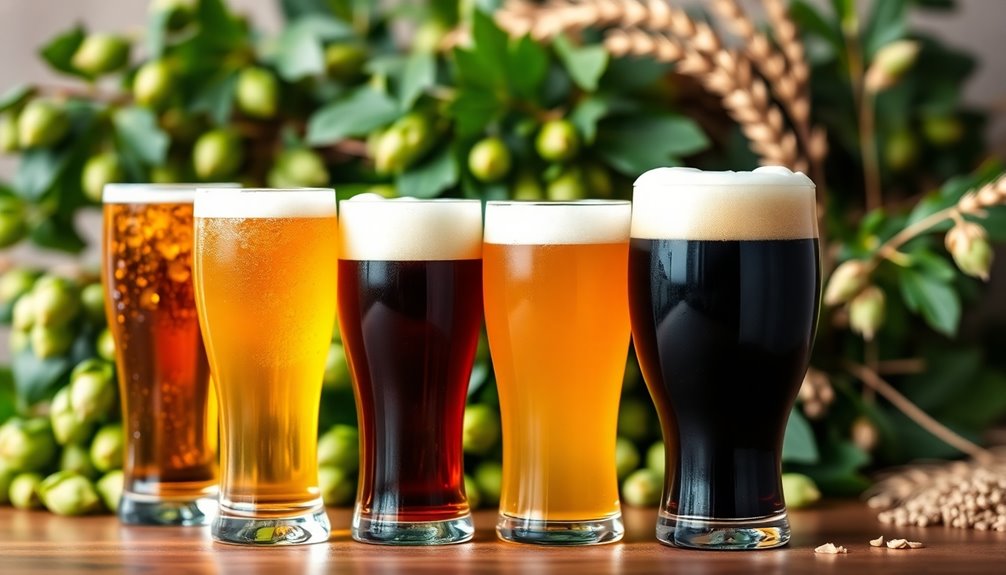
While exploring the diverse world of beer, you'll quickly notice that the primary distinctions lie between ales and lagers, each offering unique characteristics and flavors.
Ales are fermented at warmer temperatures using top-fermenting yeast, resulting in a fruitier and more complex flavor profile. You'll find styles like porters and brown ales that boast rich, deep flavors with notes of caramel, chocolate, and coffee. Ales can also have a wider alcohol content range, typically falling between 4.5-12.0% ABV. This category includes popular styles such as IPA, known for its bold hop flavors and aromas.
On the other hand, lagers are brewed at cooler temperatures with bottom-fermenting yeast, giving them a cleaner and crisper taste. Pilsners, a popular lager style, can be distinguished by their light, golden color and balanced bitterness, often enhanced by noble or Saaz hops. Lagers usually maintain a more consistent ABV, making them a reliable choice for those who prefer steadiness.
Understanding these distinctions helps you appreciate the variety of flavors and styles available, ensuring you choose the right beer for any occasion while keeping your health-conscious preferences in mind.
Top Non-GMO Beer Recommendations
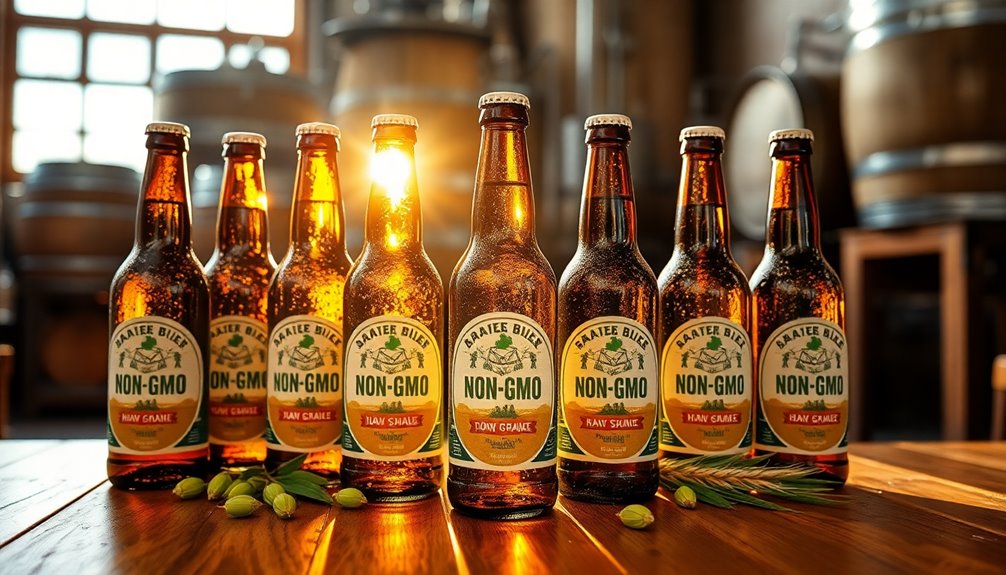
Exploring the world of non-GMO beers opens up a range of flavorful options that cater to health-conscious drinkers.
If you're looking for top recommendations, consider Northcoast Brewing Company, which offers a variety of non-GMO options like IPAs and wheat beers. Additionally, they are recognized for their commitment to non-GMO brewing practices.
Samuel Smith is another fantastic choice, crafting organic and vegan brews from the UK. For a German twist, try Pinkus, known for its Hefe-weizen and Pilsner.
Sierra Nevada stands out with its commitment to using non-GMO sourced materials across all its varieties, including their popular IPA.
If you prefer lighter options, Heineken Light combines non-GMO ingredients with low calories, making it a smart choice.
For craft beer enthusiasts, Steam Whistle Brewing offers a GMO-free Pilsner and a new IPA.
Dogfish Head features non-GMO options with a focus on organic ingredients.
Mill Street Brewery in Toronto is another great pick, with over half of its beers being organic and non-GMO.
Finally, don't miss Peak Organic, which emphasizes local, artisan ingredients.
With these brands, you're sure to find a non-GMO beer that suits your taste and values.
Frequently Asked Questions
Are There Specific Certifications for Non-Gmo Beers?
Yes, there are specific certifications for non-GMO beers. The Non-GMO Project Verification is a prominent one, ensuring that no genetically modified ingredients are used.
This certification involves rigorous testing to prevent contamination. Additionally, beers labeled as organic must comply with USDA organic regulations, which also prohibit GMOs.
How Can I Identify Non-Gmo Beers in Stores?
To identify non-GMO beers in stores, look for the Non-GMO Project Verification label or USDA Organic certification on the packaging.
Check ingredient lists for natural components and avoid any that mention genetically modified ingredients.
Research the brewery's commitment to non-GMO practices through their website or customer feedback.
You might also contact them directly if you can't find information.
Opt for beers made with organic ingredients for a safer choice.
What Is the Price Range for Non-Gmo Beers?
The price range for non-GMO beers typically falls between $3 and $7 for a 12oz can or bottle.
If you're looking for a 6-pack, expect to pay between $15 and $20, especially for craft options.
Some special or limited editions can cost significantly more, reaching up to $71.99 for a case.
Keep an eye out for sales and discounts, especially online, to snag a better deal on your favorite brews.
Do Non-Gmo Beers Have a Shorter Shelf Life?
No, non-GMO beers don't inherently have a shorter shelf life than GMO beers.
The shelf life largely depends on the beer style rather than the GMO status. Hoppy beers may degrade quicker, while high ABV or complex beers can last longer, sometimes improving with age.
Proper storage is key—keeping them in a cool, dark place and using cans can help maintain their quality.
Can I Find Non-Gmo Beer Options in Bars and Restaurants?
Yes, you can find non-GMO beer options in bars and restaurants, especially those that focus on local and craft brews.
Many establishments, particularly in areas like Midtown Sacramento, offer rotating selections that include non-GMO varieties.
Look for menus that highlight ingredient transparency or ask the staff about their non-GMO options.
Breweries often label their beers, so checking for Non-GMO Project verification can help you make informed choices while enjoying your drink.
Conclusion
Choosing non-GMO beers not only supports your health-conscious lifestyle but also promotes sustainable farming practices. With a variety of options available, you can enjoy flavorful brews without compromising your values. As you explore the current market trends and discover the distinct types of non-GMO beers, you're sure to find a favorite that fits your palate. So next time you're at the store or a bar, reach for a non-GMO brew and raise a glass to better choices!










